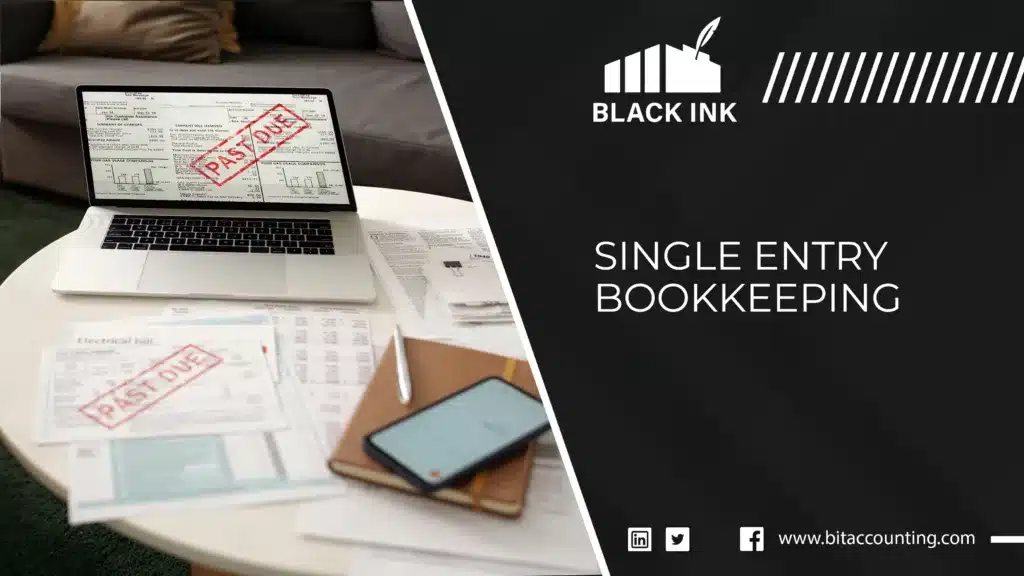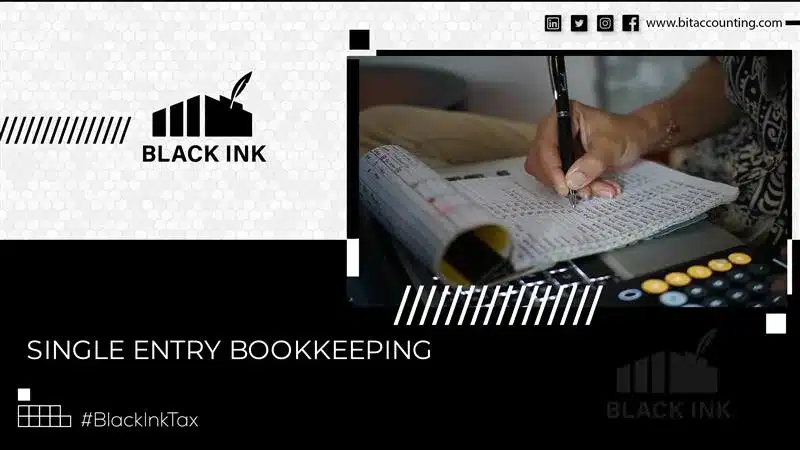
Table of Contents
The Truth About Single Entry Bookkeeping
Keeping track of money is important for every business, no matter how small. This is where bookkeeping comes in. Bookkeeping helps record all the money that comes in and goes out of a business. It gives a clear picture of profits, losses, and how the business is doing.
One method that many freelancers, solopreneurs, and very small service industries prefer is single entry bookkeeping. It’s a simple and affordable way to manage finances without needing a background in accounting or corporate finance.
In this blog, we’ll talk about what single-entry bookkeeping is, how it works, its pros and cons, how it compares to double-entry bookkeeping, and whether it’s the right fit for your business.
What Is Single Entry Bookkeeping?
Single entry bookkeeping is a basic way of recording financial transactions. It tracks income, expenses, and cash flow using just one entry per transaction. Think of it like keeping a checkbook register or using a spreadsheet for your personal finance.
Unlike double-entry bookkeeping, where each transaction affects at least two accounts (like debits and credits), single entry only records one side of the transaction.
How Single Entry Works
In a single entry system, you write down every payment, income, or expense in a single ledger or sheet. It usually includes columns like date, description, income, expenses, and balance.
Example:
May 5 – Received $500 from Client A (Income)
There’s no need to track assets, liabilities, or equity (finance). It’s a simple method that helps small businesses stay organized.
Who Uses Single Entry Bookkeeping?
This system is best for:
- Freelancers and solopreneurs
- Very small business ownerships
- Side hustles
- Businesses with few financial transactions and no complex financial reporting needs
If you’re not dealing with inventory, loans, or accounts payable/receivable, single entry can work well.
Advantages of Single Entry Bookkeeping
Single entry bookkeeping has several benefits for small or growing businesses:
- Simple to Use: Easy to understand and doesn’t require accounting skills.
- Low-Cost: No need to buy fancy bookkeeping software or hire a financial services firm.
- Time-Saving: Quicker than managing a full financial accounting system.
- Meets Basic Needs: Enough for basic income and expense tracking.
If you’re in the private sector with limited financial activity, this system helps you stay organized without overcomplicating things.
Disadvantages of Single Entry Bookkeeping
Even though it’s simple, there are some drawbacks:
- Limited Financial Insight: Doesn’t produce a balance sheet, income statement, or other important financial statements.
- Error-Prone: No way to double-check your records using trial balance like in double-entry systems.
- Not Scalable: Becomes inefficient as your business grows and deals with more financial markets and clients.
- Tax Issues: May not be enough to meet Internal Revenue Service (IRS) rules or prepare for audits.
Single Entry vs. Double Entry Bookkeeping Table of Comparison
| Feature | Single Entry | Double Entry |
| Recording | One side only (income/expense) | Two sides (debit and credit) |
| Complexity | Simple | Complex |
| Suitable for | Small businesses | Medium to large businesses |
| Produces full reports | No | Yes |
| Built-in error checking | No | Yes (trial balance, etc.) |
Key Differences Between Double Entry vs Single Entry Bookkeeping
Double-entry bookkeeping records each transaction twice – once as a debit and once as a credit. This keeps the accounting journals and ledgers balanced and makes it easier to spot mistakes.
In single-entry bookkeeping, each transaction is recorded once. It’s good for tracking revenue, expenses, and cash, but it doesn’t show how much a business owns (assets) or owes (liabilities).
When to Use Each System
Double-entry is better for growing businesses, corporations, eCommerce bookkeeping, and those needing detailed financial reporting.
On the other hand, single entry bookkeeping is ideal for small setups like freelancers, trade workers, and hobbyists who just want to track money flow.
Can You Switch from Single to Double Entry?
Yes, and sometimes you should. If you:
- Start handling inventory, loans, or tax deductions
- Need to create cash flow statements
- Want to raise investment or deal with banks
Hence, it’s time to upgrade. Switching means setting up new ledgers, getting help from an accountant, and possibly using accounting software.

How to Implement Single Entry Bookkeeping
Here quick bookkeeping tips method to implement single entry bookkeeping:
Step #1: Setting Up a Single Entry System
Choose a format:
- Paper notebook
- Spreadsheet (like Excel or Google Sheets)
- Simple software (like Wave, FreshBooks, or QuickBooks Self-Employed)
Include columns for:
- Date
- Description
- Income
- Expense
- Balance (Accounting)
Step #2: Recording Transactions
Example:
- June 1 – Received $1,000 from client (Income)
- June 3 – Paid $200 for supplies (Expense)
Log entries daily or weekly. Keep bank statements, receipts, and cheques for proof.
Step #3: Reconciling and Reviewing Records
At least once a month:
- Compare records to your bank account
- Look for mistakes or missing entries
- Adjust if needed to keep your accounts clean
Step #4: Tools for Single Entry Bookkeeping
Manual:
- Excel
- Google Sheets
Basic software:
- Wave
- FreshBooks
- QuickBooks Self-Employed
These tools help track payments, generate summaries, and support simple financial management.
Common Mistakes & How to Avoid Them
The following are few mistakes to avoid when implementing single entry bookkeeping:
Missing Transactions
Skipping records can lead to problems with tax, budgeting, and reports. Use reminders or apps to help you stay on top of entries.
Mixing Personal and Business Finances
Never use one account for both. It confuses your records and makes tax filing harder. Open a separate bank account for your business.
Not Backing Up Records
Losing your data could cost you time and money. Keep digital and physical backups, especially before tax season.
Ignoring Tax Obligations
Single-entry doesn’t always meet government finances standards. Keep detailed notes, save receipts, and consider help from a tax pro.
Is Single Entry Bookkeeping Right for You?
Explore if a single-entry bookkeeping is the right choice for you:
Assessing Your Business Needs
Ask yourself:
- How many financial transactions do I have?
- Do I need full financial statements?
- Am I applying for loans or investment?
Alternatives to Consider
- Hybrid systems: Use single-entry but review with double-entry bookkeeping now and then.
- Hire a bookkeeper or accountant for complex parts of your business.
Future-Proofing Your Finances
As your business management grows:
- Watch for signs you’ve outgrown your system.
- Upgrade to something that tracks assets, liabilities, and equity properly.
- Use software that can grow with your needs.
Conclusion
Single entry bookkeeping is a helpful and simple way for small businesses, freelancers, and side hustlers to track their money. It doesn’t take much time, saves costs, and works for basic needs. But as your business grows, you may need to move to a more advanced system like double-entry bookkeeping.
For expert help, tools, and affordable financial support, check out BIT Accounting — your partner in smart bookkeeping and small business economics success.
FAQs
1: Can I use single entry bookkeeping for taxes?
Yes, but it might not meet all rules. Make sure to keep receipts and stay organized.
2: Do I need software for single entry?
No, you can use a spreadsheet or even a notebook, but software makes it easier.
3: Is single entry legal for businesses?
Yes, for small ones. Larger businesses may need financial accounting systems that follow economic law.
4: Can I track debt with single entry?
Not very well. Single entry focuses on cash movement, not liability or asset tracking.
5: What’s better for growing businesses?
Double-entry bookkeeping is better for tracking detailed financial transactions and creating full reports.
GET FREE QUOTE FOR ALL OF OUR SERVICES
Black Ink will send you a free analysis of your current state and what would be the cost of managing either a separate accounting and bookkeeping services or a complete solution across New York, USA. Do get in touch and we will be happy to consult you with our bookkeeping services in NY, New York, USA.
